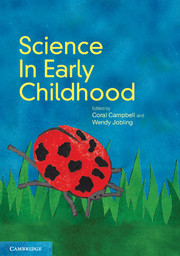Book contents
- Frontmatter
- Contents
- Contributors
- INTRODUCTION
- CHAPTER 1 SCIENCE IN THE NATIONAL EARLY YEARS LEARNING FRAMEWORK
- CHAPTER 2 LEARNING THEORIES RELATED TO EARLY CHILDHOOD SCIENCE EDUCATION
- CHAPTER 3 USING PLAY PEDAGOGY IN THE EARLY YEARS
- CHAPTER 4 TEACHING APPROACHES
- CHAPTER 5 DEVELOPING PEDAGOGICAL PRACTICES FOR SCIENCE TEACHING AND LEARNING WITH 3 AND 4-YEAR-OLD CHILDREN
- CHAPTER 6 EFFECTIVE SCIENCE LEARNING ENVIRONMENTS
- CHAPTER 7 LEARNING SCIENCE IN INFORMAL CONTEXTS: THE HOME AND COMMUNITY
- CHAPTER 8 ENVIRONMENTAL EDUCATION FOR SUSTAINABILITY AND ITS PLACE WITHIN SCIENCE
- CHAPTER 9 CATERING FOR CHILDREN'S DIFFERING NEEDS IN EARLY CHILDHOOD SCIENCE EDUCATION
- CHAPTER 10 PLANNING FOR SCIENCE
- CHAPTER 11 OBSERVING, ASSESSING AND DOCUMENTING LEARNING IN SCIENCE
- CHAPTER 12 PROFESSIONAL LEARNING – REFLECTIVE PRACTICE IN SCIENCE EDUCATION
- Additional resources
- Appendix
- Glossary
- Index
CHAPTER 11 - OBSERVING, ASSESSING AND DOCUMENTING LEARNING IN SCIENCE
- Frontmatter
- Contents
- Contributors
- INTRODUCTION
- CHAPTER 1 SCIENCE IN THE NATIONAL EARLY YEARS LEARNING FRAMEWORK
- CHAPTER 2 LEARNING THEORIES RELATED TO EARLY CHILDHOOD SCIENCE EDUCATION
- CHAPTER 3 USING PLAY PEDAGOGY IN THE EARLY YEARS
- CHAPTER 4 TEACHING APPROACHES
- CHAPTER 5 DEVELOPING PEDAGOGICAL PRACTICES FOR SCIENCE TEACHING AND LEARNING WITH 3 AND 4-YEAR-OLD CHILDREN
- CHAPTER 6 EFFECTIVE SCIENCE LEARNING ENVIRONMENTS
- CHAPTER 7 LEARNING SCIENCE IN INFORMAL CONTEXTS: THE HOME AND COMMUNITY
- CHAPTER 8 ENVIRONMENTAL EDUCATION FOR SUSTAINABILITY AND ITS PLACE WITHIN SCIENCE
- CHAPTER 9 CATERING FOR CHILDREN'S DIFFERING NEEDS IN EARLY CHILDHOOD SCIENCE EDUCATION
- CHAPTER 10 PLANNING FOR SCIENCE
- CHAPTER 11 OBSERVING, ASSESSING AND DOCUMENTING LEARNING IN SCIENCE
- CHAPTER 12 PROFESSIONAL LEARNING – REFLECTIVE PRACTICE IN SCIENCE EDUCATION
- Additional resources
- Appendix
- Glossary
- Index
Summary
Objectives
At the end of this chapter, you will be able to:
describe and document children's learning in science with reference to the EYLF
describe ways children's explorations can demonstrate and enhance their understanding
describe different strategies for observing, monitoring and documenting science understanding.
Overview
Early childhood educators are required to determine what children know and understand. Evidence may be based on how children explore and interact within their environment, or specific competency tests. Data relating to science is usually obtained through a process of observation, anecdotal note taking, journal entries, checklists and folios of each child's work. At times the determination of science knowledge, understanding and children's development may be easier said than done. Consequently, this chapter outlines steps associated with the development of learning in science. These steps are outlined in the EYLF (DEEWR, 2009a), with an indication of some associated strategies that are appropriate for each developmental level. These guidelines provide a comprehensive framework to determine children's learning as well as enhancing the teacher's planning for future learning.
Children's learning
The EYLF (DEEWR, 2009a) advocates that children learn through play and that play based learning is ‘a context for learning through which children organise and make sense of their social worlds, as they engage actively with people, objects and representations’ (p. 3). Within play based learning, the role of the educator is crucial for developing a child's understanding of the world around them and the science within it.
- Type
- Chapter
- Information
- Science in Early Childhood , pp. 163 - 176Publisher: Cambridge University PressPrint publication year: 2012



